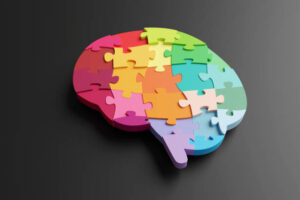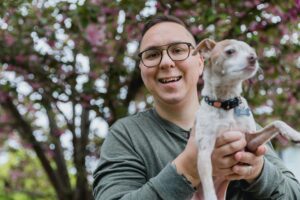It’s Neurodiversity Celebration Week (17th – 23rd March 2025), which encourages everyone to celebrate neurological differences and recognise the talents and strengths of neurodivergent individuals.

Neurodiversity Celebration Week is a global initiative founded in the UK in 2018 by Siena Castellon MBE, who has campaigned to support young people with special educational needs (SEN) from a young age.
The multi-award-winning autism advocate and anti-bullying campaigner, who is herself diagnosed with autism, dyslexia, dyspraxia and ADHD, founded the annual awareness week to help create more inclusive and equitable cultures that celebrate different minds.
Neurodiversity Celebration Week also focuses on challenging stereotypes and the negative misconceptions surrounding neurodiversity. It aims to change the way that people with learning disabilities and neurodivergent individuals are perceived by society.
Schools, universities and workplaces are encouraged to get involved and highlight the benefits that neurodiversity can bring.
Siena explains that Neurodiversity Celebration Week was primarily founded to “change the narrative” around neurodiversity and “create a balanced view which focuses equally on our talents and strengths.”
As a worldwide awareness campaign, it aims to “help the world to understand, value and celebrate the talents of neurodiverse minds.”
Neurodiversity Celebration Week increases understanding and inclusion

The celebration week works with schools, universities and organisations to:
- Increase acceptance and understanding
- Provide education
- Celebrate neurodiversity
They want to empower individuals to succeed.
Anyone can get involved with Neurodiversity Celebration Week, and there are a number of free events happening throughout the week, you can find out more at the campaign’s dedicated website.
As well as resources and support for schools, universities and workplaces, and social media packs for supporters, the website also provides content for students and their parents.
Neurodiversity Celebration Week is supported by organisations such as Mentally Healthy Schools, which provides a special toolkit, Inclusive Employers, NHS Employers, The Brain Charity, local authorities and a number of British universities.
What is neurodiversity?
 Neurodiversity is the concept that some people have natural variations, or differences, in how their brains work, and how they experience the world.
Neurodiversity is the concept that some people have natural variations, or differences, in how their brains work, and how they experience the world.
A sociologist named Judy Singer, who is on the autism spectrum, came up with the term in the 1990s to describe these natural brain differences. Neurodiversity describes the full spectrum of neurological or neurodevelopmental conditions, such as autism, dyslexia or attention deficit hyperactivity disorder (ADHD).
Neurodivergent or neurodistinct are terms commonly used to refer to individuals with a neurological condition.
An opposite term is neurotypical, which is often used to refer to people who do not have a neurological condition. Neurotypical means that the way a person’s brain functions and processes information and the way they behave is viewed to be ‘standard’.
It is believed that around 1 in 7 people in the UK (15%) are neurodiverse. That’s about 10-13 million people. Across the world, 15-20% of all people living are thought to be neurodivergent.
Figures also suggest:
- Around 10% of the UK population has dyslexia
- 8% of people in the UK have ADHD
- 8% of people in the Uk have dyspraxia
- 6% of people in the UK are thought to have dyscalculia
- 1% of people in the UK have an autism spectrum condition
- 1% of people in the Uk are thought to have Tourette’s Syndrome
Committed to inclusion this Neurodiversity Celebration Week
 First Response Training (FRT) is a leading national training provider delivering courses in subjects such as health and safety, first aid, fire safety, manual handling, food safety, mental health, health and social care, safeguarding and more.
First Response Training (FRT) is a leading national training provider delivering courses in subjects such as health and safety, first aid, fire safety, manual handling, food safety, mental health, health and social care, safeguarding and more.
They are a Disability Confident Committed Employer and were recently awarded INclusive Worcestershire Leader status. This means they are a fair, equitable and inclusive employer
who is proactively and continuously striving for positive change.
As one of the first training providers approved to deliver the Oliver McGowan Mandatory Training on Learning Disability and Autism, they work with many Experts with Lived Experience of autism and learning disabilities across the UK. These Expert Co-Trainers are recruited and supported by a specialist team at FRT, who ensures that reasonable adjustments specific to each Expert Co-Trainer are maintained throughout their employment.
Neurodiversity training solutions
 FRT have also developed and delivered a number of Neurodiversity training courses, such as Introduction to the Autism Spectrum, ADHD Awareness, Dyslexia Awareness, Sensory Processing Disorder Awareness and SEND Awareness.
FRT have also developed and delivered a number of Neurodiversity training courses, such as Introduction to the Autism Spectrum, ADHD Awareness, Dyslexia Awareness, Sensory Processing Disorder Awareness and SEND Awareness.
They have also previously worked in partnership with clients to develop bespoke training for them in topics such as Adapting Learning for SEND and, SEND and Barriers to Learning.
A trainer from FRT says:
“Whether in schools, universities, workplaces or our communities, we need to focus on fostering environments where everyone can thrive.
“With 15% of the UK population identifying as neurodivergent, businesses must take meaningful steps to provide support, make reasonable adjustments, and educate their workforce.
“At First Response Training, we are committed to inclusion through flexible policies, neurodiversity training, and practical workplace adjustments. We can support our clients to make the same commitment, firstly with training to empower staff with the essential knowledge and skills to support neurodivergent individuals, and then with useful resources to help you continue your journey.”
Download FRT’s Neurodiversity Training Brochure here.
You can also download their free Neurodiversity Training Guide and a guide to creating an inclusive workplace for neurodivergent employees.
For more information on the training that FRT can provide, please call them today on freephone 0800 310 2300 or send an e-mail to info@firstresponsetraining.com.
